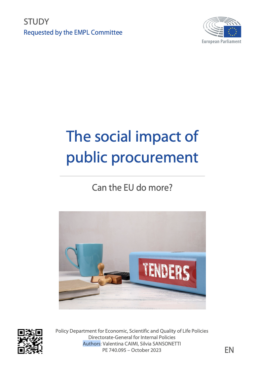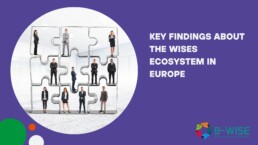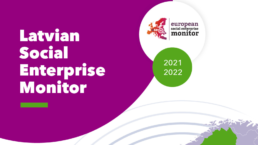The social impact of public procurement - can the EU do more?
The aim of this study is to present the possibilities offered by Directive 2014/24/EU on public procurement for the achievement of social goals and to analyse how these possibilities have been transposed into national law and implemented by contracting authorities across the EU. Another aim is to identify obstacles to the use of existing provisions and make recommendations with regards to possible future EU action.
This document was provided by the Policy Department for Economic, Scientific and Quality of Life Policies at the request of the Committee on Employment and Social affairs (EMPL Committee).
Seven years after its entry into force, it is legitimate to wonder what kind of social impact this Directive might have produced and to what extent SRPP is used in the EU. Until now, there has been no evaluation of this Directive from the European Commission. This study attempts to fill this gap and provide some answers on the state of play of SRPP in the EU.
Key findings about the work integration social enterprises ecosystem in Europe
In the framework of Work Package 1 “Research – State of the Art”, EURICSE made some key findings about the WISEs ecosystem in Europe, labour policies and skills needs and gaps.
The labour market: trends and challenges
Work is crucial to both the welfare of every human being and to the stability of societies. However, unlike the standard assumptions of neoclassical theoretical models, the labour market is far from being perfect. On the one side, there are applicants that are highly qualified and trained, who normally have good career prospects; on the opposite side, are positioned workers that are at risk of labour market exclusion, i.e., workers with support needs (WSN), e.g., people with disabilities (PWDs); people with substance use disorders; convicts and former convicts; long-term unemployed; homeless people; asylum seekers, refugees, and migrants; NEETs; women survivors of violence; members of ethnic minorities and people with low qualifications.
Since their formation, modern welfare states have adopted labour policies to support the work integration of WSNs. These policies can be classified into four main groups: (i) regulatory policies, which consist of the adoption of quota systems that oblige all or some enterprises to hire a minimum percentage of WSNs; (ii) compensation policies, which compensate enterprises for WSNs’ lower productivity; (iii) substitutive policies, aimed at creating a “substitutive labour market”; and (iv) supported employment, which consists of a mix of policies that intervene directly with dedicated tutors to support the selection and training costs of enterprises integrating WSNs.
Nevertheless, most of these policies have proved unable to ensure a balanced allocation of the available labour force. The existence of large groups of unemployed persons who are at risk of social exclusion has encouraged the search for alternative work-integration pathways. Work Integration Social Enterprises (WISEs) are one of the most innovative and successful examples.
Drawing on a preliminary analysis of WISEs in all the Member States (MSs) of the European Union (EU) and an empirical analysis consisting of both a face-to-face and an online survey carried out in the 13 B-WISE partner countries, the report analyses the main drivers, features and development trends of WISEs in the EU. Furthermore, the report investigates the skills needs and gaps of WISEs’ workers, especially in the digital area.
Work integration Social Enterprises: drivers, features, and models of integration
WISEs are an institutional mechanism of supported employment that favours workers discriminated against by conventional enterprises and provides them with appropriate on-the-job training. Thanks to the expertise accumulated in working with WSNs, WISEs design organisational processes that suit employees’ needs and take stock of their skills and capabilities. WISEs are double-output enterprises; indeed, in addition to trading marketable goods and services, they also deliver work integration support services to WSNs otherwise excluded from the labour market.
In some countries (e.g., France, Greece, and Italy), WISEs have emerged from below, mainly thanks to the self-organisation of supporters, the families of WSNs or WSNs themselves; in other countries (e.g., Bulgaria, Croatia, Lithuania, Slovenia and Spain), WISEs have evolved from traditional sheltered workshops, which have progressively shifted to a more entrepreneurial stance and started to behave more and more like WISEs.
Since their emergence, WISEs have developed different models of integration. While some WISEs are structured to create stable job positions for WSNs within the organisation itself (permanent integration model), some other WISEs train WSNs on the job to prepare them to work in the mainstream labour market (transitional integration model). A third group of WISEs have developed a mixed integration model. Several factors explain the choice of a particular model of integration, including the types of WSNs integrated, the incentives and constraints of public policies, the connections of WISEs with labour policies and the degree of interaction of WISEs with other potential employers.
WISEs operate in a wide spectrum of economic sectors. The lion’s share are however labour-intensive industries (e.g., manufacturing, construction, cleaning) where low added-value jobs predominate, requiring low levels of specialization from the workers’ side.
WISE recognition
The report maps the legal structures of both legally recognised WISEs and WISEs that operate “outside the radar”, as they are neither legally defined as WISEs, nor conceived as WISEs by the organizations themselves.
WISEs vary to a great extent across EU in terms of legislation: while in some countries (e.g., Belgium, France, Germany, Greece, Italy, Portugal, Slovenia and Spain) WISEs have a specific legal framework that applies to them, in other countries (e.g., Austria, Estonia, Ireland, Netherlands and Sweden) WISEs mainly use traditional legal forms that were neither specifically designed for them, nor for social enterprises whatsoever. There are moreover countries (e.g., Czechia, Denmark, Finland, Hungary, Latvia, Luxembourg, Poland, Romania and Slovakia) where the ad hoc legislation for WISEs introduced are rather ineffective and the newly established WISEs continue to use legal forms that have not been designed for them. In some countries, WISEs are registered in special registers (e.g., in Sweden) or are identifiable thanks to specific funding schemes (e.g., in Austria) or private mark (e.g., in the Netherlands).
Noteworthy is that in countries such as e.g., Italy, changes in legislation have been either essential or key in fostering the development of WISEs on a wide scale. Finally, in countries (e.g., Bulgaria, Croatia, Lithuania, Slovenia and Spain) where sheltered workshops have transformed into fully-fledged enterprises, WISEs use legal forms or statuses that were originally designed for the former.
WISE resources
Running a WISE entails higher production costs (mainly related to the training and supervision of WSNs integrated) when compared to conventional enterprises. WISEs struggle moreover to access repayable resources owing to their specific not-for-profit nature. For these reasons, WISEs have developed peculiar models of sustainability and rely upon a mix of public and private resources, including non-monetary contributions (e.g., voluntary contributions, donations received from members and assets made available by the community); non-repayable resources (public – e.g., subsidies and grants to cover investments in fixed assets, support for workplace adaptation and training – and private, e.g., indivisible reserves resulting from the constraint on the distribution of profits); repayable resources (from e.g., socially-oriented and ethical banks); fiscal advantages and resources from income generating activities thanks to the selling of goods and services to public agencies, individuals, and conventional enterprises.
As highlighted by the B-WISE research, there is overall a need for more enabling public schemes and policies. The great majority of EU MSs have indeed inconsistent and fragmented public support systems, which fail to consider adequately the social responsibility taken on by WISEs. In more than a few countries, there is disproportionate access to public support resources – which depends on the target groups addressed by WISEs – with WISEs integrating PWDs having access to a more generous support system. In other countries, only selected typologies of WISEs benefit from a targeted support system, whereas the remaining typologies have no access to support measures whatsoever.
Country patterns: from traditional labour policies to WISEs
WISEs can be clustered in three groups of countries: (i) Central and Eastern Europe (i.e., Bulgaria, Croatia, Latvia, Poland, Romania and Slovenia), (ii) Southern Europe (i.e., Greece, Italy and Spain) and (iii) Western Europe (i.e., Austria, Belgium, France, Germany and the Netherlands).
In Central and Eastern Europe WISEs are the most widely recognized social enterprise typology. In these countries, WISEs legal recognition and public support are relatively unsatisfactory, whereas the EU has played a major role in supporting their development.
In Southern Europe, WISEs are strongly rooted in the longstanding tradition of cooperatives and they have been legally recognized. Key challenges influencing the development of WISEs include high unemployment rates, the presence of a large informal sector, a high segmentation of the labour market and a poor development of active labour market policies.
In Western Europe, active labour market policies are well developed; they have on the one hand contributed to higher employment rate and, on the other hand, they have led to more flexible labour markets. While WISEs are fully integrated in the welfare system in Austria and Belgium, they are treated like any other enterprise in the Netherlands, where an “equal playing field for all enterprises” exists.
Technical and soft skills in WISEs
The aim of the B-WISE face-to-face empirical analysis was to identify skills needs and gaps of three target groups: (i) enablers (e.g., manager, area coordinators, and ICT specialists); (ii) supporters (e.g., job coaches, tutors and mentors) and (iii) WSNs. Drawing on the European Skills, Competences, Qualification and Occupations (ESCO) framework, 403 workers were interviewed so as to examine their skills endowments and gaps.
Based on the research conducted, to perform their jobs, enablers require a broad spectrum of managerial as well as communication, collaboration and creativity-related skills. Supporters – who deal with a variety of activities, from planning work time and space to assist WSNs – need a mix of both hard and soft skills. In their view, the most relevant skills are those related to the training and support of WSNs. Lastly, according to WSNs, operational skills – such as sorting and packaging goods, cleaning and assembling products – are essential to carry out day-to-day activities with accuracy, precision and autonomy.
While there is no significant gap between skills relevance and skills endowment, there is room for improvement for all the three target groups, especially in those skills that are considered as most relevant. According to both enablers and supporters, skills gaps are mainly due to the lack of economic resources. Based on enablers’ responses, also labour shortages of workers with the needed job profile have however a role in explaining their own skills gaps. Supporters consider by contrast the scarcity of suitable training activities a key explaining factor. Lastly, WSNs identify the lack of time to learn new skills as the most relevant reason explaining their own skill gaps.
Enablers’ and supporters’ skills gaps negatively affect their capacity to assist current or additional WSNs in their work integration paths. The main concern for WSNs is their inability to work while ensuring proper quality and/or speed, which may provoke delays or hamper the quality of the products/services supplied to customers. Training is seen as the most important measure to address skills gaps, but the lack of resources to be allocated to training by most WISEs hinders training attendance. On top of this, respondents highlight the lack of suitable training activities that are fully tailored to address the skills gaps especially of WSNs.
Technology and digital skills gaps in WISEs
Relying on both the findings of the face-to-face and online survey (completed by 175 enablers), the study shows how technologies and digitisation processes are – especially in large WISEs, in which the level of digitization is higher compared with smaller ones – applied to a large extent in management process (through e.g., the use of cloud computing services and e-invoices) and for the standardization of production processes (through e.g., technologies like Enterprise Resource Planning software packages). Conversely, some advance technologies such as Artificial Intelligence, rapid prototyping and assistive technologies are considered less relevant.
For what specifically concerns digital skills, there are no significant discrepancies between the relevance of digital skills and their level of endowment for the three target groups. Enablers are the category of WISE workers who most need these skills. On the contrary, WSNs require little digital skills to carry out their work activities and digital skills seem to be more relevant in their private life activities rather than at work.
As for technical and soft skills, there is room for improvement of digital skills for the three target groups. However, a difficulty in finding training initiatives for bridging these gaps has been detected, especially for WSNs.
Development trends and challenges
In all the countries where they operate, WISEs have demonstrated their ability to tackle key problems of labour exclusion affecting contemporary economies that traditional labour market policies had proved unable to tackle. In spite of their success, WISEs potential is still far from being harnessed.
WISE visibility has increased significantly over the past decades and new laws recognizing WISEs – especially via legal statuses – have been adopted in a growing number of EU MSs. Noteworthy is also the trend of recognising WISEs via cooperative legislation adjustment, which is diffused in countries distinguished by a longstanding cooperative tradition.
The scarce development of ex lege WISEs in some countries can be traced back to two main factors: the insufficient degree of engagement of WISEs in law-making processes and the policy-makers’ incapacity to identify all types of organizations that may be considered WISEs.
All in all, there is a trend towards the broadening of WISEs target groups: in the past, PWDs were the only group conceived as disadvantaged while in more recent times, the concept of disadvantage has been progressively enlarged so as to include a broader set of vulnerable workers.
Another key trend development detected is that, over the past decade, the domains of engagement of WISEs have progressively broadened towards fields – such as those related to ICT, culture and the management of cultural heritage – with a higher added value.
Analysis confirms however that to fully exploit the added value of WISEs, a more enabling environment is needed. In particular, there is a need for more enabling public schemes and policies. New market access opportunities for WISEs are nevertheless emerging from the 2014 EU Directives on public procurement.
Innovative strategies are being moreover experimented by some WISEs with a view to improve their integration capacity. Among the most innovative, collaborations between WISEs and conventional enterprises are becoming a widespread strategy in some countries also as part of particular legal and/or policy schemes, such as quota systems. Worth mentioning is also the tendency to build networks that group WISEs together.
When it comes to skills development, WISEs face specific challenges. The level of skills endowment of the three groups of workers targeted by the empirical analysis seems to be rather good. However, data show that there is substantial room for improvement and failure to fill these skills gaps could jeopardize WISEs’ capacity to assist current and/or new WSNs. Training activities are considered particularly important, but the lack of time and resources – especially in small WISEs – to be allocated to training hinders training attendance. As regards specifically WSNs, targeted training, planned on the basis of their needs and capabilities, is needed.
Considering digital skills, results show that there are no significant discrepancies between their relevance and the level of endowment for the three target groups. Worth noting is that for WSNs specifically, digital skills seem to acquire a higher relevance in private life activities compared with work activities.
Another important tendency emerged is that the level of digitization is higher in larger WISEs. However, technologies such as Artificial Intelligence, rapid prototyping and assistive technology are considered as less relevant and therefore are rarely used within WISEs. Nevertheless, those are important technologies, mainly for the adaptation of WSNs’ individual workplaces, and their potential should be fully-exploited by WISEs.
The B-WISE project, Blueprint for Sectoral Cooperation on Skills in Work Integration Social Enterprises, is an Erasmus + project coordinated by EASPD with the support of ENSIE.
What are the skills needed for work integration social enterprises' workers?
Various skills are needed for WISEs workers (enablers, managers and workers with support needs), here are the highlights of the report.
One of the research activities led in the framework of work package 1 was to map skills needs and gaps in WISEs across the 13 project partner countries. It was led in the form of an empirical analysis to map the skills needed to perform the jobs and fill the skills gaps in WISEs, with a view to profiling the training requirements of three main professional profiles, namely “enablers” (e.g., managers, area coordinators, IT specialists ); “supporters” (e.g., job coaches, tutors, and mentors) and and workers with support needs (WSNs)*. Face-to-face interviews were conducted with 403 persons (89 enablers, 145 supporters, and 169 WSNs) from a sample of around 100 WISEs in 13 countries across the EU. The investigation analyzed the available skills deemed as the most relevant for the above mentioned categories of workers and skills gaps. In addition, the reasons for such skills gaps, their effects on WISEs, and the strategies put in place to cope with them were examined.
The skills needs and skills gaps analysis highlighted four key findings.
First, the survey showcased that WISEs face specific challenges when compared to conventional companies. The level of skills endowment of all three respondent groups was rather good, with enablers and supporters particularly well aware of the broad set of skills needed to work in WISEs. The data analysis did not highlight any significant difference across countries, but it confirmed there is substantial room for improvement. Failing to fill skills gaps is regarded as particularly risky since it could jeopardize WISEs’ capacity to assist current and/or new WSNs and lead to an increased workload for staff. In other words, skills gaps could hinder the process of work integration.
Second, the various groups of respondents chose specific skills as particularly relevant. Enablers rated management skills as highly important: from designing strategies for the development of WISEs and making decisions to engaging in direct relations with employees to coordinate their activities and motivate them. Among other skills, negotiating with clients, especially private ones, was perceived as highly relevant. Supporters pointed out the multifaceted nature of work as they deal with a variety of activities, including planning work time and space, assisting and supporting WSNs in carrying out their tasks, and managing and reporting activities to their supervisors and coordinators. A mix of hard and soft skills is required, the balance of which also varies according to the specific role assumed by a supporter within an organization. However, what clearly emerged is that “assisting workers with support needs for their job” is crucial when looking at supporters. Interviews highlighted that counseling and mentoring activities, in some cases, aim to stimulate workers in their own growth at work: they favor a positive atmosphere and even touch on some personal aspects that impact work. Some interviewees felt that they have received all the necessary tools to manage the support and counseling of WSNs. There were cases in which a lack of training related to psychological aspects of the job, as well as the diverse typologies of workers’ disabilities, influenced the effectiveness of supporters’ activities. Finally, “collaborative, communicative and operational skills” were essential for WSNs to carry out day-to-day work activities with accuracy, precision, and autonomy. The importance of specific skills depended on the type of economic activity carried out, which in the sample interviewed ranged from manufacturing to administrative/office activities, catering, and waste management.
Third, when looking at enablers’ skills, the age of the organization makes a difference. Start-up WISEs need to build new skills to recruit the most suitable staff and develop effective working teams, while in more structured WISEs, the development of organizational and decision-making strategies comes to the fore.
Finally, from a comparative viewpoint, all three respondent groups considered specialized technical knowledge related to media and technology as not relevant; this can be traced back to the key role played by soft skills and other technical knowledge necessary to assist workers in carrying out their job tasks in WISEs.
Against the background of addressing skills gaps, respondents consider training activities particularly important. Based on their answers, training is primarily financed by WISEs’ own resources: most WISEs provide for training internally or support employees’ participation in external training.
Looking at the reasons behind skills gaps, enablers and supporters expressed similar opinions by identifying the shortage of economic resources as a very important factor and the lack of motivation as the least relevant reason. To tackle the scarcity of resources, one strategy is to support WISEs’ access to private funding schemes by encouraging their desire for collaboration via mutually supportive mechanisms.
An additional obstacle to filling skills gaps is the lack of time, which is typically a barrier in relation to training activities in small organizations. WISEs, especially when they are small in size, struggle to detach personnel from their required work activities. In these situations, training carried out within the organizations and combining both theoretical and practical activities can help WISEs overcome this problem.
Moreover, according to respondents, it is particularly difficult to identify the optimal training activities to improve supporters’ and WSNs’ abilities. Indeed, training activities may be stressful, especially for WSNs, when they are not fully tailored to address their specific skills gaps. Thus, it is important to invest time and energy in adapting training and education to the specific needs of recipients. Hence, individualized and targeted training designed and planned based on workers’ real needs and capabilities is crucial.
Finally, the findings of the survey underline the importance of further research on both the content and modalities of training., which will be done later in the B-WISE project.
Read the full report HERE.
The B-WISE project, Blueprint for Sectoral Cooperation on Skills in Work Integration Social Enterprises, is an Erasmus + project coordinated by EASPD with the support of ENSIE.
* E.g., people with physical and/or sensory disabilities; people with intellectual and/or learning disabilities; people with psycho-social disabilities and/or mental illness; people with substance use disorders; convicts and ex-convicts; people on long-term unemployment; homeless people; asylum seekers, refugees, and migrants; NEETs; female survivors of violence and members of ethnic minorities.
Latvian Social Enterprise Monitoring (ESEM)
For the first time European Social Enterprise Monitor (ESEM) has been run in Latvia – we see it as an important step in creating evidence-based policies.
ESEM 2021 – 2022 is an annual study on social entrepreneurship across Europe. The aim is to provide decision-makers in government, business, academics and civil society with data and insights on social enterprises and the social enterprise ecosystem. ESEM will enable them to take a deeper look at the potential and challenges of social entrepreneurship and, in particular, to support evidence-based policy-making, and further develop financial and non-financial support.
The data was gathered by the Social Entrepreneurship association of Latvia with the support of the Ministry of Welfare, Social Entrepreneurship Accelerator New Door and Reach for Change Latvia.

Read or download both European Social Enterprise Monitoring and Latvian Social Enterprise Monitoring.
















